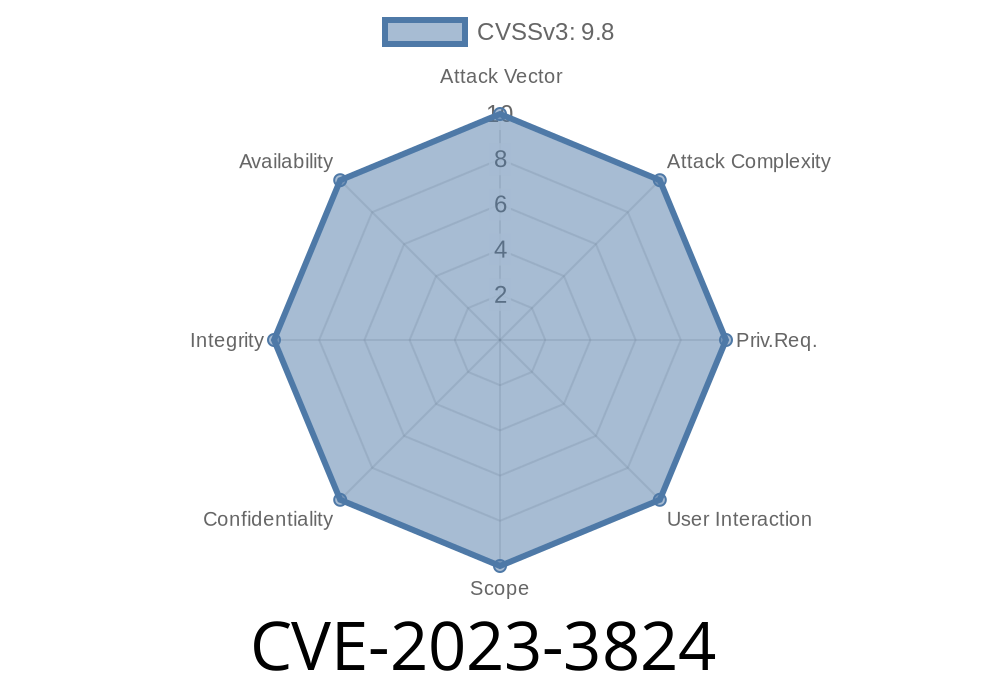PHP powers a big part of the web and is used by millions of websites and applications. But even popular software isn’t immune to dangerous bugs. One critical vulnerability discovered in 2023, known as CVE-2023-3824, affected PHP’s handling of *phar* archive files. If exploited, it could allow an attacker to corrupt memory, crash PHP, or possibly run malicious code (Remote Code Execution, or RCE) on the server.
Let’s break down how this bug happened, what versions are affected, and how attackers can exploit it — with easy-to-follow explanations and code samples.
What Is a Phar File?
A PHAR file is a special kind of archive for PHP code — like a .zip or .tar but made for PHP and used to bundle libraries, apps, or plugins. PHP includes built-in support for reading these files, and this is where the bug was lurking.
Vulnerability
When PHP loads a .phar file, it reads directory entries inside. There was *insufficient* checking to make sure the amount of data being read was “safe.” If the phar file was crafted in the right way, it could cause a stack buffer overflow — where extra data “overflows” and writes into adjacent memory. This can crash software, corrupt memory, and sometimes (if skillfully exploited) let attackers run their own code.
Technical Details
When a phar file is loaded, PHP parses its internal structure. Directory entries tell PHP which files are inside the archive. In affected PHP versions, when reading these directory entries, PHP failed to properly check if the length claimed in the archive matches the actual buffer size.
Root in the Source
The vulnerable code is in the phar extensions codebase. Here’s the problematic logic simplified:
// Vulnerable snippet (simplified)
char buf[4096];
size_t len;
len = // read length declared by entry
fread(buf, 1, len, fp); // No proper bounds check on len!
// If len > 4096, buffer overflow
If an attacker makes a phar file that declares a huge length in its entries, but provides only a small buffer, fread will write off the end of buf, crashing PHP or potentially letting the attacker take control.
> Original Fix: In the patched versions, PHP checks the declared length before reading and ensures it never exceeds the buffer.
The vulnerable PHP version running with Phar file support.
- The ability to upload or make PHP handle a crafted .phar file (or something, like an image or plugin, containing one).
Deliver the phar file to the server — through file upload, inclusion, or path traversal.
3. Trigger the vulnerability by making PHP process the file (e.g., file_exists("phar://uploads/malicious.phar/file.txt")).
Example Payload
Here’s a simple example (for illustration) using Python to make an oversized phar header (not a full exploit, but the general idea):
with open('evil.phar', 'wb') as f:
# Write a real-looking PHAR header
f.write(b'<?php __HALT_COMPILER(); ?>\r\n')
# Then append crafted directory entry with huge length
f.write(b'\x00'*100) # Fake manifest
f.write(b'\xff'*500) # Huge bogus entry payload
When PHP tries to read this, it overruns its internal buffer.
Full RCE would take more finesse, but this shows the basics: triggering a buffer overflow, potentially leading to other attacks if the memory is manipulated correctly (as shown in writeups for similar PHP bugs).
References & Further Reading
- CVE-2023-3824 on cve.org
- PHP official changelog 8.1.22
- PHP Phar extension documentation
- Twitter thread with exploit insights
- PHP Source Patch
Use secure file handling: Never process or open user-uploaded files as phar unless 100% trusted.
If you must handle uploaded files: Check their MIME type and content, not just the extension.
Summary
CVE-2023-3824 shows why even mature technologies like PHP need continuous security attention. If your application uses phar files — directly or indirectly — update PHP ASAP. With a simple crafted file, hackers could potentially crash your apps, corrupt memory, or even take over your server.
Timeline
Published on: 08/11/2023 06:15:00 UTC
Last modified on: 08/25/2023 23:15:00 UTC
